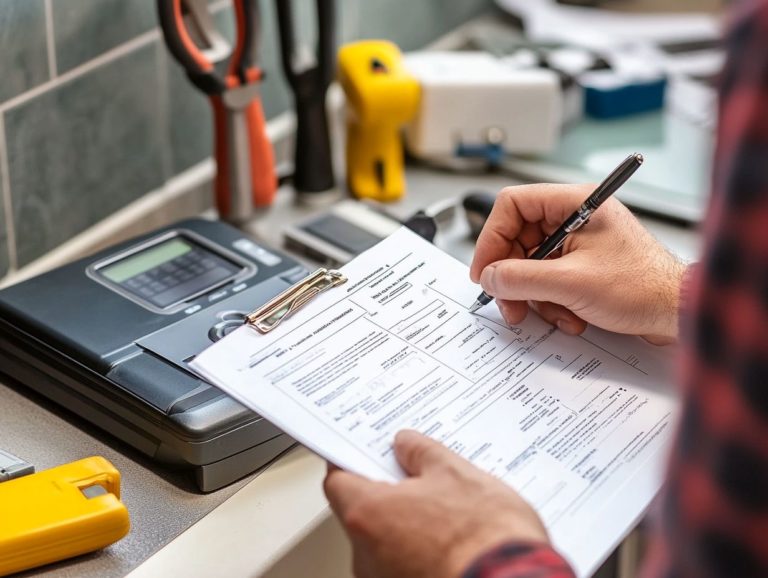5 Questions You Should Ask About Your Car Warranty
Car warranties can be confusing. Knowing what’s included and any limits is crucial for new car owners or those extending an existing warranty.
This article distills the vital questions you should consider regarding your car warranty. From learning how to make a claim to what to do if you encounter a breakdown outside of your coverage, this information helps you make smart choices and safeguard your investment.
Contents
- Key Takeaways:
- 1. What Is Covered Under the Warranty?
- 2. How Long Does the Warranty Last?
- 3. Are There Any Restrictions or Limitations?
- 4. What Is the Process for Making a Claim?
- 5. Is the Warranty Transferable?
- 6. What Is the Cost of Extending the Warranty?
- 7. Will Regular Maintenance Be Covered?
- 8. What If My Car Breaks Down After the Warranty Expires?
- 9. What Are the Warranty Exclusions?
- 10. How Do I Cancel the Warranty?
- 11. What Happens If the Manufacturer Goes Out of Business?
- 12. Is the Warranty Valid in All States?
- 13. How Do I Know If I Need an Extended Warranty?
- 14. Can I Purchase a Warranty After Buying the Car?
- 15. What Are the Benefits of Having a Car Warranty?
- Frequently Asked Questions
Key Takeaways:
- Understanding the coverage of your car warranty is crucial to avoid unexpected expenses.
- Knowing the duration of your car warranty helps plan for future repairs and replacements.
- Be aware of restrictions or limitations on your car warranty to avoid voiding the coverage.
1. What Is Covered Under the Warranty?
Understanding the scope of your extra coverage (extended warranty) is crucial for safeguarding your vehicle against unexpected repair costs. This awareness provides peace of mind and secures your finances, whether you own a new or used vehicle.
Extended warranties offer varying levels of protection, ranging from basic auto services to comprehensive factory warranty coverage. The specifics depend on your warranty provider and the options you choose, including repair coverage for various service scenarios.
It’s important to know the difference between factory warranties and third-party options. Factory warranties, like those from Hyundai, cover repairs and defects during the initial ownership period. Unlike factory warranties, extended warranties provide protection long after the factory warranty expires.
Common coverage elements often include:
- Repair bills
- Vehicle service contracts
- Aftermarket parts
This is especially helpful for Tesla owners, where specific components can come with a hefty price tag for replacement. By grasping these details, you empower yourself to select the most suitable warranty provider, ensuring a thorough understanding of the terms and conditions associated with your coverage.
2. How Long Does the Warranty Last?
The length of coverage provided by a warranty can vary significantly based on the type you choose—be it an extended warranty or a factory warranty—and the specific terms set forth by the warranty provider.
Typically, a bumper-to-bumper warranty covers a wide array of vehicle components and lasts around three to five years or a specific mileage limit, often between 36,000 to 60,000 miles. On the other hand, powertrain warranties, which concentrate on vital systems like the engine and transmission, frequently extend for five to ten years or even up to 100,000 miles.
Factors such as your vehicle’s age and mileage can greatly influence these coverage lengths, as some warranties may become void once a vehicle surpasses a certain threshold.
Manufacturer guidelines and policies often dictate the specific terms of coverage, ensuring comprehensive protection. Consulting consumer reports can help you compare warranty options effectively.
3. Are There Any Restrictions or Limitations?
Most warranties have specific rules that could impact your eligibility and the claims you can make. It’s essential to familiarize yourself with these details before investing in a car warranty.
Restrictions often include stipulations regarding the use of aftermarket parts, which could void your coverage if they aren’t approved by the warranty provider. Additionally, you may need to follow certain maintenance rules—think regular oil changes or inspections—and failing to adhere to these may result in denied claims.
Vehicle usage limitations also play a significant role; for instance, using your car for business use or off-roading could lead to losing your coverage. Companies like Endurance and CARCHEX often have their specific exclusions, so it’s crucial to read warranty agreements thoroughly. This way, you can avoid inadvertently agreeing to unfavorable terms that could lead to unexpected costs down the line.
4. What Is the Process for Making a Claim?
The process for filing a warranty claim can differ between providers, but it typically involves straightforward steps for securing repair coverage for your vehicle’s issues. First, you should collect important documents like service records and warranty information, as these provide essential context for your claim. Some providers may charge diagnostic fees if an inspection is required before they approve your claim.
Providers like CarShield and Xcelerate Auto emphasize the importance of following their structured claims process to the letter. Adhering to all steps meticulously can improve your chances of a successful warranty claim.
Being organized can make your claims process smoother, allowing you to navigate the process with confidence.
5. Is the Warranty Transferable?
A transferable warranty is a great feature for vehicle owners. It elevates the value of your vehicle and offers future buyers peace of mind, ensuring they enjoy continued coverage under the warranty policies set by the original owner. Typically, manufacturer warranties are easier to transfer than extended warranties, which often come with stricter conditions or additional fees.
Knowing these policies helps you because a transferable warranty can increase your vehicle’s resale value, instilling confidence in prospective owners about their reliable protection.
Having such a warranty in place can set your vehicle apart in a competitive market, making it more desirable and potentially leading to quicker sales.
6. What Is the Cost of Extending the Warranty?
Extending your warranty comes with various costs, influenced by the coverage options you choose, the type of vehicle you own, and whether you opt for a manufacturer or after-market warranty.
Key factors such as your vehicle’s make, model, age, and overall condition play a significant role in determining these costs. For instance, luxury or high-performance vehicles often come with higher warranty premiums due to their expensive parts and specialized repairs.
Compare independent warranty providers with factory options, considering the benefits of comprehensive coverage and customer service, while keeping an eye on any potential limitations in claims processing.
7. Will Regular Maintenance Be Covered?
Make regular maintenance coverage a priority. Some warranties may offer specific vehicle service provisions, while others might leave out routine maintenance costs entirely.
Know what’s included in your warranty. Extended warranties often cover basic services like oil changes, tire rotations, and brake adjustments, significantly lightening the financial load of routine upkeep. By carefully reviewing the fine print, you can sidestep unexpected repair bills arising from misunderstandings about your warranty’s limitations.
Being informed about these details helps you budget smarter and keep essential services without overspending.
8. What If My Car Breaks Down After the Warranty Expires?
If your vehicle breaks down beyond the warranty coverage, brace yourself for potentially hefty repair costs. This scenario underscores the importance of fully understanding your warranty exclusions and exploring available repair options.
In such moments, stay calm and assess the situation. Unexpected breakdowns often happen due to missed maintenance or the natural wear and tear of age.
Once you pinpoint the issue, consider reaching out to independent repair shops for competitive pricing and contact your warranty provider to check if any coverage still applies after the warranty period ends.
A solid roadside assistance plan can ease the stress of unexpected breakdowns, ensuring help is just a call away when you need it most.
9. What Are the Warranty Exclusions?
Knowing your warranty exclusions is essential. These limitations can lead to unexpected repair costs during repairs.
Many extended warranties exclude wear and tear issues, meaning items like brake pads or tires may not be covered after their lifespan. If you decide to make modifications to your vehicle, such as adding custom parts or aftermarket systems, be aware that these could void parts of your warranty, leaving you solely responsible for repairs.
Neglecting proper maintenance, such as failing to keep a service log, could also lead to claim denials. Therefore, it’s crucial to meticulously review the warranty details before making a purchase, ensuring you fully grasp all coverage limitations to sidestep any surprises in the future.
10. How Do I Cancel the Warranty?
Canceling a warranty can be straightforward if you are well-acquainted with your warranty agreements. Understand the specific policies and any potential fees that may apply.
Start by contacting your warranty provider, which you can typically do via phone or through their online portal. Having your warranty documentation readily available is essential, as you’ll likely need to provide details like your warranty number and personal information.
Depending on the provider’s policy, cancellation could have various implications, including potential refunds. Be aware that some providers may charge cancellation fees.
11. What Happens If the Manufacturer Goes Out of Business?
If a vehicle manufacturer goes out of business, it can greatly impact your warranty. This situation might jeopardize the validity of your coverage, leaving you in need of alternative solutions.
In such unfortunate scenarios, you could find yourself in a tricky spot regarding repairs and service. The news of a manufacturer’s bankruptcy often creates confusion about whether your warranties will still be honored or rendered void altogether.
Explore options like aftermarket warranties or third-party providers, which can provide a layer of protection even when the original manufacturer is no longer in operation. Understanding warranty policies empowers you to pursue the right recourse for necessary repairs.
12. Is the Warranty Valid in All States?
Your vehicle warranty’s validity can vary by state, making it essential for you to grasp your warranty policies, particularly when relocating or traveling across state lines.
In different regions, specific laws can greatly influence the enforcement and coverage of warranties, especially extended warranties with additional stipulations. For instance, in California, stringent regulations are in place to protect consumers, ensuring you receive the benefits you’re entitled to under warranty agreements. However, these protections may not be consistent in other states, creating potential gaps that could leave you exposed.
It’s crucial to read the details of your warranty to uncover any state-specific limitations or requirements. This way, you can fully understand what is covered and what might not be once you venture beyond state boundaries.
13. How Do I Know If I Need an Extended Warranty?
Determining whether you need an extended warranty often hinges on several key factors, including the age and condition of your vehicle, your driving habits, and your desire for peace of mind regarding potential repair costs.
Before making a decision, weigh various elements. Consider your vehicle’s reliability ratings, the historical frequency and type of repairs it has required, and its overall maintenance history. Reviewing reports detailing the performance of similar models can offer valuable insights into potential future expenses.
Proactive measures, such as regular servicing and mindful driving, can significantly extend your vehicle’s lifespan and minimize repair costs. Assess your situation before committing to additional coverage.
14. Can I Purchase a Warranty After Buying the Car?
Purchasing a warranty after acquiring a car is often an option for you, allowing you to secure coverage even after the initial purchase, as long as you meet the specific requirements set by warranty providers.
These requirements typically involve your vehicle’s age, mileage, and overall condition at the time of application. You usually have a window of 30 to 90 days following your purchase to secure such coverage, giving you peace of mind without the worry of unexpected repair costs.
Waiting to get a vehicle service contract can be a savvy strategy, offering protection from hefty future bills tied to unavoidable breakdowns, particularly if your vehicle has a reputation for reliability issues. Ultimately, obtaining this coverage later bolsters your financial security.
15. What Are the Benefits of Having a Car Warranty?
Having a car warranty presents a wealth of benefits, including financial protection against unexpected auto repairs and a sense of tranquility whether you drive a new model or a well-loved used car.
This coverage typically encompasses repair bills, diagnostics, and even scheduled maintenance services, significantly alleviating costs tied to keeping your vehicle in peak condition. Imagine your vehicle suddenly breaking down; a warranty eases the burden of hefty repair expenses, allowing you to focus on getting back on the road instead of fretting over your finances.
The peace of mind that comes with a dependable car warranty inspires you to adopt better car care habits, encouraging regular maintenance appointments. This proactive mindset prolongs your vehicle’s lifespan and reduces the likelihood of unexpected issues, culminating in a smoother and less stressful ownership experience.
Frequently Asked Questions
What is a car warranty and why is it important?
A car warranty is a contract between the car manufacturer or dealership and the car owner that provides coverage for certain repairs and replacements for a set period of time or mileage. It is important because it can save you money on unexpected car repairs.
What is covered under a car warranty?
The coverage of a car warranty can vary, but typically it covers the cost of repairs for defects in materials or workmanship. It may also cover certain components such as the engine, transmission, and electrical system. It is important to read the warranty carefully to fully understand what is covered.
How long does a car warranty last?
A car warranty typically lasts between 3 years or 36,000 miles and 10 years or 100,000 miles. This varies by manufacturer or dealership. Some also offer extended coverage for a fee.
Can I buy a car warranty after purchase?
You can buy a car warranty after your purchase. Some dealerships offer extended warranties at the time of sale, but you can also choose a third-party provider anytime while owning the car.
What should I consider when buying a car warranty?
Consider the coverage length, what’s included, the deductible, and the warranty provider’s reputation. Ensure the warranty aligns with your needs and budget.
Can I transfer my warranty to someone else?
Some warranties can transfer to a new owner, while others are valid only for the original buyer. Check the warranty terms to see if it’s transferable, as this can affect your car’s resale value.

.jpg_00.jpeg)
.jpg_01.jpeg)
.jpg_10.jpeg)
.jpg_11.jpeg)




